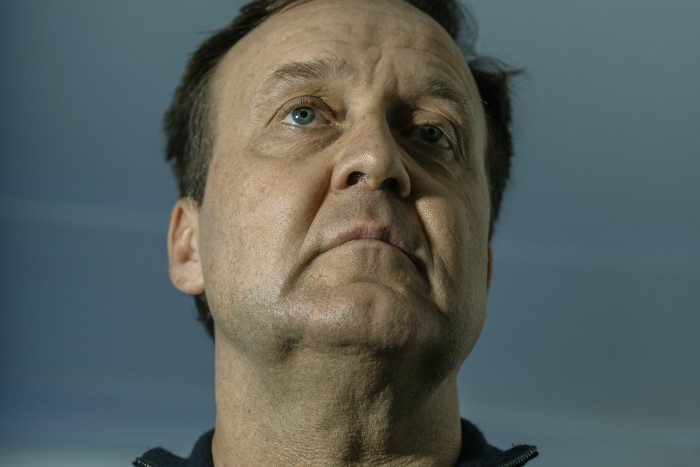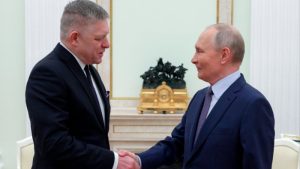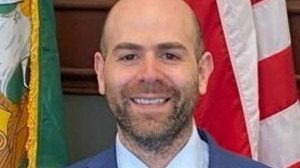Niels Troost has a staggering story to tell about how he got sanctioned

On a frigid morning in February 2022, Niels Troost was at home in Geneva when news broke that 190,000 Russian troops had marched into Ukraine. As he scrolled through headlines and messages on his phone, he could hardly believe he was reading about a land invasion taking place in Europe. The 52-year-old had been trading Russian oil for almost 30 years, developing a lucrative niche by marketing a special type of crude from the country’s far east. He thought about all the Russian and Ukrainian business partners he’d made over the course of his career.
Later, at his offices overlooking the lake, Troost and his small team began to parse the business implications. Troost is tall, with broad shoulders and a long face that comes to an abrupt stop at a square chin with a deep dimple in the centre. He speaks English with only a hint of an accent from his native Netherlands. Troost liked to say he was no longer motivated by profit. The logo of his company, Paramount Energy and Commodities SA, showed three mountain peaks, one for each of his children. With their encouragement, he had begun to invest revenues from Russian deals into energy and agricultural projects in Africa.
For now, Paramount’s business was entirely dependent on a nation that had just declared war on the western world. Everything he had built was at risk. For the next two months Troost worked day and night, often alone, trying to understand the rapidly growing restrictions on doing business with Russia. Unlike its much larger rivals, which employed numerous regulatory specialists, Paramount’s staff numbered only 17. It was a highly profitable but simple business, wholly dependent on Troost’s personal relationships.
Fearing military escalation after the invasion, the EU and US had coalesced around a plan to hit back with targeted economic sanctions that would hurt Vladimir Putin and his acolytes’ finances. But retaliating with rules is not as straightforward as hitting a launch button. A modern sanctions programme is akin to software that needs close monitoring and frequent patching. Since 2022, for instance, the EU has updated its Russian sanctions at least 14 times, attempting to close loopholes and squash unintended bugs. The longer they last, the more complex the sanctions become.
By the beginning of April that year, the EU’s sanctions covered 1,091 individuals and 80 companies. There were no restrictions on exporting oil from Russia, but Paramount’s banks in Switzerland were already telling the company to take its business elsewhere. At home, Troost’s children, who were in their late teens and early twenties, were following the news too and asking whether he shouldn’t shut the company down altogether.
Larger traders such as Trafigura, also based in Geneva, announced they would stop trading Russian crude. Troost considered walking away, but none of the privately owned Russian oil producers he dealt with had been sanctioned. And he had contracts with Chinese customers he was obliged to fulfil as long as they did not break international rules.
The war was not Troost’s only problem. He had also fallen out with a former fixer, who had claimed to be working as a “special agent” for the CIA and was now threatening to create problems for Paramount after their business relationship soured. Desperate for help, Troost turned to a well-connected friend, who suggested he speak to someone who really was involved with the CIA.

Gaurav Kumar Srivastava, or “G” as he liked to be called, was an American businessman and philanthropist in his early thirties. He appeared to have set up a generously endowed family foundation to help address global hunger and energy scarcity. Troost’s friend told him what he wouldn’t find by searching G’s name online, that his company, Unity Resources Group, carried out missions for US intelligence. G had told him about how he’d sold weapons to Libya, built an Indonesian fishing fleet to spy on China and saved the life of a former governor in Afghanistan. Troost’s friend assured him he’d spoken to the Afghan man on the phone himself. He’d described G as his “saviour”.
In early May, Troost was introduced to G over the phone. G listened to his problems, then cut to the chase. He said he could provide an “umbrella” of US government protection, which would allow Paramount to continue its dealings in Russia without fear. Eventually, G could also secure a licence from the US Treasury department to make that protection official.
If the promises seem grandiose in retrospect, G appeared to know what he was talking about in the moment. The US needed companies like Paramount, he explained, to increase its control over key commodity flows, such as oil exports from Russia and rare metals, currently dominated by China. Penalising Russia for the war was important, but aggressive sanctions risked pushing commodity trading further into the shadows and ultimately undermining the primacy of the dollar. G seemed especially fluent in matters of foreign policy, regularly name-dropping high-level US officials.
For the first time since the invasion, Troost perceived a glimmer of hope. Over the following months, he allowed himself to be pulled further and further into a relationship with G that would ultimately push Troost to the edge of reason. As the war ground on and western powers hardened against Russia and its business partners, Troost would find himself caught in a tightening vice, pressed between common sense and the fear of losing Paramount, his life’s work. Eventually, Troost and one of his directors would become the only Europeans to be sanctioned for dealing Russian oil, his accounts frozen, his business closed and his reputation in tatters.
Before they agreed to meet, G proved the extent of his competence and connections. First, he asked for a detailed account of what had happened with the former fixer, with whom Troost had fallen out. A week or so later, G called to inform him the man had filed a report to the FBI, accusing Troost of having ties to the Kremlin and Russian money laundering. Luckily, G explained, he had intervened and convinced authorities Troost was innocent. But there were some hoops to jump through.
There was a phone call with a former Nato commander and US presidential candidate, General Wesley Clark, during which they discussed commodity trading opportunities. Then Troost had to be screened by a former Goldman Sachs trader, who G said was working with the FBI. Troost sent a private plane to collect the man from Spain, and the two met in a room at a private Swiss airport. He peppered Troost with questions about the extent of his connections in Russia and kept repeating that he needed to know everything about the business. G assured him it was all par for the course.
Soon, there was good news. G had spoken with FBI director Christopher Wray, and Troost had passed. Troost had had his doubts but, by the time they decided to meet in person, G had seemingly resolved the problem with his former fixer and made introductions that suggested he had relationships at the highest levels of the US government.
In July 2022, Troost flew to Indonesia, where G told him he was spending the summer preparing for the upcoming G20 meeting. They were to stay at Como Shambhala, an opulent wellness resort nestled in the jungle of central Bali, where monkeys skitter over the thatched roofs, basking in the sun between thunderous rainstorms. Basic accommodations start at about $950 a night. G had rented three villas with dark, hardwood floors and lavish furnishings.
On July 4, Troost celebrated US Independence Day with G and his family. G had thick eyebrows and a gregarious grin, outlined by a bushy black beard. If he appeared to be packing on a little extra weight, he said, that was due to a stomach wound he had suffered in Afghanistan. He wore a navy polo shirt with an Air Force One logo and, as he had on the phone, seemed comfortable opining on matters of international politics. As the two men talked into the night, Troost felt a weight lifting. In G, he had not only found a new business partner, but a kindred spirit. “We spoke about our backgrounds and what has happened in our lives,” Troost wrote later in an email to colleagues. “We came to the conclusion that we have the same ambition and share the same values and goals.”
On a second trip to Indonesia later that month, Troost was accompanied by his wife, Jacqueline. She also found G charming and charismatic. At one point, G and Troost took a 24-hour jaunt to Jakarta, where they met with Prabowo Subianto, Indonesia’s defence minister at the time. (He is now president.) G and Troost travelled to his residence, where the minister warmly greeted his friend “Mr G” and they all ate hamburgers. Prabowo’s brother later told Troost that G had helped remove Prabowo’s name from a US no-entry list, for which the family was grateful.
Troost was impressed. While still in Indonesia, he emailed Paramount’s non-executive director, a lawyer and his tax adviser with news of a plan that had been hashed out in the jungle. “I’ve agreed to team up with a new partner who will join as an equal shareholder in Paramount,” he wrote. “We will grow the activity of the company worldwide and the new shareholder’s input will consist of making his worldwide network available.” Troost had agreed to sell G half the company for SFr50,000 ($57,000). In turn, G’s involvement would enable Paramount to trade Russian oil and other commodities with the support of the US government.

As Paramount’s sole shareholder, Troost had never taken a dividend, preferring to use profits to fund the company’s African projects. That meant it had accumulated several hundred million dollars of retained earnings as of July 2022, which Troost’s advisers needed time to exclude from the transaction making G a partner. “This is extremely important and urgent and cannot wait or be postponed,” Troost wrote in all caps to his head of accounts four days later. “The survival and future of the company depends on it.”
For reasons of “operational security”, G said he could not own the Paramount stake in his name, according to Troost. Instead, an associate of G’s would hold it on his behalf as a trustee, documents show. It was Nicolas Bravard, the former Goldman trader who had grilled Troost in the private Swiss airport. G asked that Troost not disclose his relationship with the CIA to Paramount employees, Troost said. He complied, referring to Bravard as his “new partner” in his first emails to staff. The secrecy made sense, Troost thought, although he did tell Jacqueline.
The more G and Troost travelled together, the more doors opened. That first summer, he returned to Jakarta two more times. On the final trip, they flew by helicopter through the sprawling city’s tower blocks to visit Indra Bakrie, scion of a powerful Indonesian business dynasty, on his private island. Then G invited Troost to an awards dinner in New York, celebrating Indonesia’s president and Google chief executive Sundar Pichai, among others. Troost disliked formal occasions, but he hired a dinner suit and Jacqueline joined. The couple took smiling selfies with G and his wife on the street outside the venue.
During those whirlwind weeks of international travel, Troost and G were in near-constant contact. G sent multiple messages a day, often using the encrypted app Signal. The phone calls and messages would start in the afternoon, Swiss time, once G had woken up in Los Angeles, and continue late into the night. As they talked, they began developing the plan that would take Paramount to the next level.
In early September 2022, G7 leaders confirmed their intention to impose another measure designed to punish the Kremlin without causing a major shock to the fragile global economy. Under the new proposal, the EU would embargo imports of Russian oil, but western companies could continue to support the export of Russian oil to other parts of the world, if it was sold at a discount to market prices.
Troost was sceptical, as were other veteran traders. The fixed-price caps under discussion failed to account for variations in price between different Russian crude blends, or in how those prices were set when cargoes were traded. Not only would it be difficult to enforce, it would probably push the Russian oil trade “underground”, Troost wrote in a series of company memos he shared with G.
Troost and G developed an alternative plan, a programme that would involve the US Treasury licensing a small number of experienced traders, such as Paramount, to continue to trade oil from Russian producers. Payments would be routed through designated banks for monitoring. This select group would still buy at a discount to market prices, but those discounts would vary more widely, depending on the specific product. Such a programme would keep “bad actors” out of the business and stand a greater chance of Russian co-operation, Troost reasoned.
It would also be good for Paramount. One problem facing the company was that the oil it specialised in marketing, known as ESPO blend, traded at a premium to other Russian crudes. Troost had already moved the company’s ESPO deals from Paramount to a subsidiary called Paramount Energy & Commodities DMCC in the United Arab Emirates, where local banks were still amenable. But continuing the business, even from the UAE, was likely to be challenging once the G7’s new rules were in place. G’s promised US support meant the two men would not only be able to protect Paramount’s existing business, but expand it.
In early November 2022, G and Troost were back in Bali, this time with an opportunity to discuss the idea of a licensing programme publicly. The occasion was a food security forum funded with the help of a $1mn donation from the Gaurav and Sharon Srivastava Family Foundation. G was in his element, almost presidential, as he steered two days of dialogue on how to bring down energy prices and feed the world. Throughout, he wore a small US flag pinned to his lapel. “Like many of you in the audience, I have tasted the horrors of war,” he said in a keynote. “We must devise alternative plans to keep the energy flowing,” he continued. “We need a programme that can be managed and maintained through clear and transparent reporting mechanisms with banking support from trustworthy institutions.”
Troost understood he was talking about the licensing programme they had devised together, although G never explicitly said as much. Before singer John Legend came to the stage to close out the forum, G told the crowd: “Remember, there is nothing more human than morality.”
In the summer of 2022, around the time he was first getting to know G, Troost attended a graduation celebration in Geneva and found himself talking to a Swiss woman named Susanne. A former customs officer, she had been raised to be direct, and Troost liked her straight-talking style. “Wherever you’re working now, I’ll pay you twice as much,” he said. The offer was typical of the man who had built Paramount on instinct and handshakes.

Susanne, who asked that the FT not use her last name, had just been turned down for a raise at the venture capital firm where she’d worked for many years. She accepted Troost’s proposal and started that November, as he was preparing to head to the Bali forum.
As his executive assistant, she dealt with everything from travel to the ongoing discussions with G and Bravard over the structure of the partnership. The relationship between Troost and Bravard had been fractious from the start. “I’m actually shocked Nicolas said this!” Troost had written to G earlier in the summer, after Bravard appeared to accuse Troost of hiding part of Paramount’s profits.
In contrast, Troost was becoming ever-closer to G. “We should drive in an old pick-up across the States and just listen to music,” he messaged G in October.
“Would love that,” G replied.
Troost’s dependence on G startled Susanne. His international network of connections appeared to be real, as did his relationship with the prestigious American law firm, BakerHostetler, which represented him and later signed Paramount as a client. But she couldn’t shake the feeling something was off. “I found this G person just bizarre,” Susanne told me. “I kept googling him every day because we knew nothing about him.”
Other Paramount staff were also uneasy, including François Mauron, the company director in charge of Paramount DMCC in Dubai. As the start of the G7’s price cap in December 2022 approached, Mauron was getting anxious about continuing the Russian business without G’s promised licence from the US Treasury’s Office of Foreign Assets Control (Ofac). Paramount’s lawyers had advised that Emirati subsidiaries of European companies were not required to comply with the G7’s rules if they did not use western services. But as a Swiss national, Mauron felt he was in a grey zone that could expose him.
Around the same time, Mauron approved a $51mn loan, arranged by G, from Paramount DMCC to an Indonesian company, Arsari Group, owned by Prabowo’s brother. The money was to be used to fund a biofuels project, Mauron was told, but he was uncomfortable with the pressure G had placed on him to close.
Meanwhile, the requirements of the partnership with G started to change. In order to get the Ofac licence, it was no longer sufficient for G to own half the company, via Bravard. Instead Paramount needed to be redomiciled in the US in a process that G and lawyers at BakerHostetler referred to as an “inversion”. Troost and G, through their respective investment vehicles, would each own 50 per cent of a US holding company, which would in turn own Paramount SA and Paramount DMCC, according to a diagram of one proposed structure seen by the FT.
G became exasperated, as talks over how to structure the partnership dragged on. Troost’s lawyers had advised that Swiss tax authorities were unlikely to accept that SFr50,000 represented fair value for 50 per cent of a company making tens of millions of dollars in profit a year. They suggested coming up with a new structure. “If we [do] this, I would have lied and fronted to several agencies,” G complained to Troost in a message in February 2023. “And it is a snowball from there on. This is not an isolated tax issue . . . I am actually pissed off.”
Troost had his own frustrations, not least spiralling legal costs. “We are using BakerHostetler as employees. We cannot continue with that,” he wrote to G the same month. “We’ll end up working just to pay their bills.” G was racking up other charges for which Paramount was on the hook. In January, he had received $5.2mn for what he described in an email to Troost as “Paramount-related expenses”. But, according to Troost, G had then failed to provide the necessary receipts and invoices. (BakerHostetler did not respond to several requests for comments.)
In March that year, I first contacted Troost about Paramount DMCC’s continued trading of ESPO crude, which was pricing above the $60-per-barrel cap set by G7 countries. According to messages seen by the FT, one of G’s advisers suggested that Troost respond by telling me that Paramount was “operating with the knowledge and consent of the US government”. He quickly reversed himself. “Niels: I wrote too soon. Gaurav does not want mention of the US government to the FT or other media.”
The subsequent article made the rounds in the closely knit oil-trading community and put Troost in the spotlight. But G had some good news: the Ofac process appeared to be moving along. Troost needed to fly to LA, sign some paperwork in the local “CIA office” and take a lie-detector test, after which they would both fly to Washington to meet US government officials. Then they would finally collect the licence.
Troost landed at LAX later that month. But, according to his account, G informed him there had been complications. The promised meetings never happened.
Back in Geneva, Susanne’s persistent googling paid off. She found a real estate article listing G as the new owner of a $24.5mn California mansion and became convinced he must have used Paramount’s money to buy it. Without telling Troost, she called a private investigator based in Geneva, named Jonas Rey. Pressure was building on Troost to complete the inversion, so Rey didn’t have much time. It didn’t take him long to unearth concerns.
Troost was having breakfast at the Federal Palace hotel in Lagos, Nigeria, when Susanne called. “Are you sitting down?” she asked, before laying out what Rey had found.
“Susanne, shut the f*ck up!” Troost shouted down the phone.
“Look Niels, I know this is difficult for you. I’m really trying to save the company,” she told him. “G is a conman.”
Troost refused to believe her. He bashed out a long email to G and Bravard, imploring them to make good on their original promise. “I entered into a deal with G because of what he told me he can do for us,” he wrote. “I didn’t verify anything or question his background, ability or anything else . . . there is total trust. We’re in this together now and we’re joined at the hip.”
Two days later, still seething that Susanne had gone behind his back, Troost came home to a new problem. The Swiss sanctions agency, Seco, had written to Paramount with detailed questions about the group’s activities in Russia. “I’m very confused,” Troost wrote to G and his lawyer at BakerHostetler. “I was constantly informed that G was speaking directly to the top person at Seco . . . and dealing with this and that we got the all clear . . . Please call me urgently.”
The next morning, Susanne, the investigator Rey, Paramount’s non-executive director and a lawyer gathered around the boardroom table in the company’s Geneva office to meet with Troost. His wife Jacqueline was there for support. Rey did not mince words: G was a “professional fraudster”. His initial investigation had found no evidence of a link between G and any US government agency. In fact, G was not even an American citizen, as he had often said in public. He was an Indian national, born in 1990, with a US green card.
Between at least 2014 and 2019, G had been involved in a biotech company, which had been sued on at least four occasions, Rey continued. A security company called Unity Resources Group had existed since the early 2000s, but links between it and G were unclear, Rey added. (Unity’s founder later told me Srivastava had briefly expressed interest in investing in the business around 2019 but had never done any work “with or for” the company.)
An hour-long meeting became a day-long discussion. All of it concerning something Troost didn’t want to be true.
When Troost confronted G with Rey’s findings, he seemed unshaken. The information had been planted in the public record by the CIA, he told Troost, to make him appear more like a regular, unconnected businessman. All that mattered, G assured him, was pressing ahead with the inversion. “I have to know where we [are] going,” G messaged Troost on May 3 2023. “Action not words. I don’t care about the staff drama. It’s too much. Am I going to do this with you, Niels or not?”
At first, Troost played along, putting on a conflicted front. Half of him hoped G would indeed come up with some proof that would explain everything. Still, on Jacqueline’s advice, he now recorded their calls.
In those conversations, recordings of which were played for the FT, G seemed to scramble to save the relationship. In some calls, he talked about his work for the CIA and urged Troost to trust him. In others, he questioned Troost’s loyalty, warning that he would not be protected if he blew up the deal.
A week later, on May 10, Troost’s team pulled the plug, informing Bravard in writing that they were rescinding the share-purchase agreement. “We have uncovered tangible evidence that our company was misled,” the letter read, “due to intentional deceit by various parties including yourself.”
“Are you kidding me?” G messaged Troost in response.
That might have been the end of it, only it wasn’t. On May 11, an unknown Iranian mobile number sent Troost a video, which he did not open. Two days later, the same number sent Troost another message: “48 hours to wire 10 million [in cryptocurrency] or your unblurred confession will go public.” At the same time, the number started to message me at the FT, offering information about Troost’s operations.
After the boardroom meeting, Jacqueline did not leave her husband’s side. Troost spent most of his time at home, the physical and mental toll showing, she said. He was struggling to sleep, suffering from panic attacks and developed a stutter. “He had black thoughts, very black thoughts,” she recalled.
Finally accepting that the promised Ofac licence had been a fiction, Troost instructed Paramount DMCC to stop purchasing cargoes of Russian oil and wind up the company as soon as possible, minutes of a June 7 board meeting show. Meanwhile, his legal team weighed what to do. Paramount had given G at least $5.2mn for possibly fictitious expenses and wired Arsari Group, the Indonesian company, a very real $51mn at his request. It had also shared reams of confidential information, some of which had already started to surface in media reports attacking Troost.
Over the next six months, messages show that G and a small number of collaborators sought to pass information about Troost’s supposed misdeeds to diplomats, journalists and others. Many of the same allegations have since appeared on a website, sanctionnielstroost.com, which also includes posts about Jacqueline and their children. (Srivastava denied any involvement with the website or the Iranian phone number. The website stopped functioning after the FT sought comment, shortly before this article was published.)
On November 8 2023, Troost picked up a call from Mauron, the company director who had been in charge of Paramount DMCC in Dubai. He was livid. “You have f*cked me,” Mauron screamed. The UK government had just imposed sanctions on Mauron and Paramount DMCC.
A little over two months later, it was Troost’s turn. “Troost facilitates the unfettered trade of Russian oil outside the reach of UK and G7 sanctions,” the UK government said, adding his name and Paramount SA’s to the sanctions list. Troost first learnt about the decision when I contacted him seeking comment.
I met Troost in person for the first time in September this year. Paramount’s Geneva offices were empty. Unable to pay its creditors or maintain European bank accounts after the UK sanctions decision, the company entered liquidation in March. The landlord had given six months’ grace, but that was almost up. Pods of trading desks were collecting dust.
By then, I had been reporting on the company for almost two years, but Troost had always declined my requests to talk. He had been hesitant, he now told me, partly because G had warned him I could not be trusted. With his wife sitting next to him, the whole story poured out over the course of the next six hours.
Troost looked more like a parent one might meet at a school football game than a multimillionaire trader. He wore trainers, beige trousers and an untucked navy shirt. “I feel very ashamed,” he said. “I think I wanted to believe what he was offering me.”
One of G’s skills had been to make himself seem indispensable by constantly identifying problems that only he could solve, Troost said. Talking to G had taken up so much bandwidth that Troost had little time for the others in his life.
When Troost said this, Jacqueline nodded, a pained look on her face. The intensity of the relationship had strained their marriage. He would get home from the office, eat a rushed dinner, and then the phone calls would start until the early hours of the morning. Eventually, he started to sleep in another bedroom to stop disturbing his wife. On one occasion G had even suggested Troost get a divorce. “He sort of created this, ‘I’m your best friend. I’m your only saviour,’” Troost said.
Although the UK sanctions designation has only blocked Troost’s access to British financial services, it led to all of his banks and credit-card providers, wherever they are located, to suspend his accounts. Recently, his son was asked to leave his British university on the basis that it could no longer accept his fees, regardless of who paid them. “The effect of the UK sanctions,” Troost said, “it is — I can only say one word: devastating.”

Troost insists he would never have been sanctioned had he not met and trusted G. Like Geneva-based Paramount SA, Dubai-based Paramount DMCC would have also ceased trading all Russian oil before the price cap came into force, he said. Even so, Troost continued to go to Russia, travelling to Moscow on at least three occasions in October and November 2022, as well as in January last year. He said he had gone reluctantly, at G’s suggestion, to test the openness of Russian oil executives to the proposed licensing programme.
Last month, Troost’s name was included on a list of proposed new EU sanctions seen by the FT, meaning he could be targeted by the bloc as soon as this December. The listing cited his “affiliation” with a particular shipping company; but Troost shared documents with me showing he had sold the business in 2018. The EU declined to comment.
The view that Troost has been a major player in Moscow’s sanctions-busting oil-trading system was largely a result of misinformation spread by G, he alleged. But whereas those charged with a crime can defend themselves in court, targets of sanctions do not have that opportunity.
One month earlier, I met Gaurav Srivastava for the first time for breakfast in the London hotel where he was staying, the £1,000-a-night Four Seasons on Park Lane. We had already been speaking by telephone and exchanging messages for several months. He ordered eggs on toast, French-press coffee and orange juice. A stack of beaded bracelets poked out from his shirt cuff, as he stretched his arm across the back of the booth.
By his telling, Troost had pursued him for months. The objective of their partnership had always been to diversify Paramount away from Russia and never to gain an Ofac licence. In fact, Srivastava said, it was he who had raised concerns about Troost’s continued involvement in Russia after an audit of the business conducted by Bravard had revealed billions of dollars passing through Paramount DMCC and payments to acquire a stake in an oil terminal in Turkey. When challenged on the transactions, Troost had disliked the scrutiny and unlawfully terminated the partnership, he said.
In our previous exchanges, Srivastava denied ever having claimed any form of relationship with the CIA. “The CIA is the go-to thing for his stories,” he said of Troost. “His deflection technique.” But a few days earlier, I had listened to some of the telephone recordings Troost made in the final week of their relationship. In them, Srivastava talked directly about the CIA, his role as a covert operative with the agency and getting an Ofac licence to trade with Russia.
When I pressed him for an explanation, rather than alarm, a look of excitement flickered across his face. He dropped his head, hunched his shoulders and leaned over the table. “Niels has tools and people and skills that are being supported by a hostile foreign power and good relationships, maybe directly, to the Big Bear,” he said, in a thinly veiled reference to Putin. “They can do a lot of things. Can they make a recording? Of course. Are they helping Niels? I am sure.”
Bravard, meanwhile, told me he was engaged by Srivastava as a “fiduciary” to hold the stake in Paramount on his behalf partly for tax reasons, and then to audit the business ahead of its planned relocation to the US. “I never said or implied that I had any connection with the US government or the FBI, and have no evidence that Gaurav ever characterised me this way,” he said. “The CIA allegations are all totally bogus, a complete invention by Troost.”
Srivastava confirmed some parts of Troost’s account. He had, for example, pressed Troost not to respond to my questions. “My belief at that time was that Financial Times was being paid off by Trafigura to lie about Troost and Tom Wilson was a paid hack,” he said. Most parts he disputed, including the accusation of having siphoned Paramount funds for himself. But records provided by Troost’s lawyers show that immediately after Paramount loaned Arsari $51mn, Srivastava and his associates pressed the Indonesian company to transfer $25mn to a US entity he controlled, which he used to complete the acquisition of the California mansion.
Srivastava denied the Paramount loan was connected to the funds he received from Arsari. Arsari did not respond to several requests for comment.
Srivastava has retained lawyers from the international firm Orrick, Herrington & Sutcliffe to represent him in his ongoing battle with Troost, who he has sought to sue in Switzerland for unlawful termination of the partnership and for defamation. Over the months we communicated, Srivastava proffered many counter narratives to Troost’s allegations and challenged numerous aspects, including the date of their first interaction and what was discussed in various meetings. He denied meddling in Troost’s marital life, “misleading anyone about my citizenship status” or failing to provide invoices for $5.2mn in Paramount funds. In a long statement Srivastava later sent, he called Troost’s story “fiction” and repeatedly accused him of lying.
But ultimately, he provided little evidence to credibly support his account. Several people, including US lobbyist Ankit Desai, who helped Srivastava set up some meetings with US officials in the spring of 2023, and General Clark, said they had also been deceived by Srivastava and then terminated their respective consulting contracts with him when he failed to pay. In hindsight, the money stopped when Troost stopped funding him, they said. (Desai has since lobbied on Troost’s behalf, in what he described as an attempt to make amends.)
Troost, by contrast, shared hundreds of contemporaneous messages and emails, voice recordings and more than a dozen other people, including Paramount employees and advisers, who were able to corroborate many parts of his story. This was classic Troost, Srivastava told me. “Troost is the master victim,” he said. “He knows how to touch into your deepest emotions and you feel so sorry for him . . . but that facade only lasts for a short moment of time.”
Troost’s response was concise: “He’s a monster.”
#Niels #Troost #staggering #story #sanctioned




